Article 42: Isaac Newton and the foundation of the scientific revolution from the coffee shop
In the process of scientific development, there has been a close connection between the creative dynamics of coffee and coffee shops with the desire to discover new knowledge.
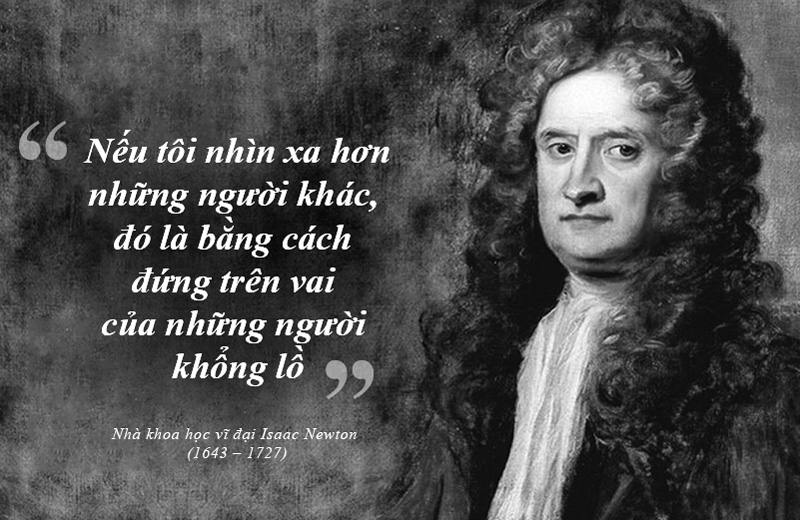
If “I have seen further, it is by standing on the shoulders of giants.” The great scientist Isaac Newton (1643 -1727)
Coffee shops – start of the scientific revolution
During the 17th century, Europe went through a series of changes in its perception of the role of science in nature, rejecting unproven theories, and yearning for an empirical understanding of cosmological laws. Advances in knowledge led to a wave of research in all fields, creating a major turning point in the development of society. European history calls this wave the scientific revolution.
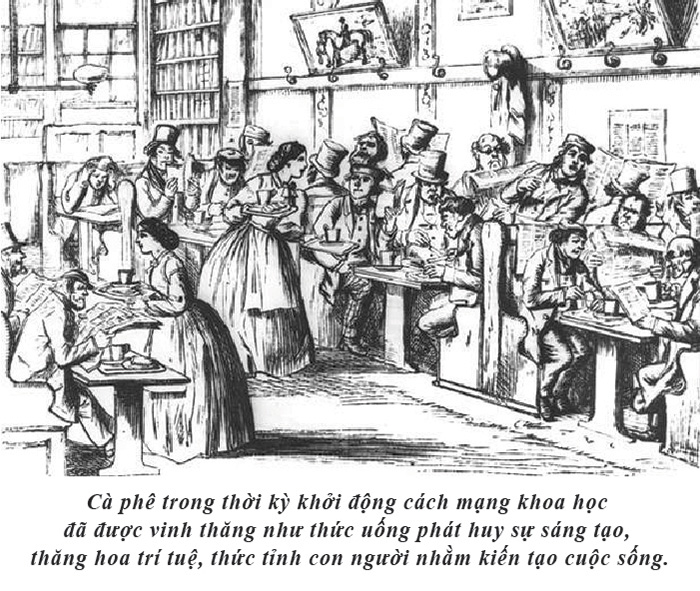
Coffee in the beginning of the scientific revolution was honored as a drink that promotes creativity, sublimates intelligence, awakens people to create life.
In the early stages, pioneering scientists believed that universities only conveyed scholastic and dogmatic knowledge. This authoritarian thinking hindered intellectual sublimation. A new form of organization was therefore needed, where people could discuss scientific progress, promote research and seek knowledge. During this period, coffee was officially known in England through the records of explorers, missionaries and merchants who had been to the “East”. In 1623, Francis Bacon (1561-1626), the father of Empiricism, described coffee in his Historia Vitae et Mortis: “This drink eases the brain and heart, and strengthens the spirit”. In 1650, the first coffee shop was established in Oxford and soon after in London.
In England, until the middle of the 17th century, people were still drunk in beer pubs, then the appearance of coffee shops triggered the “dawn of enlightenment”. Coffee promotes the creativity of the intellect, sublimates the intellect, awakens people to create a new life. Coffee shops were set up as research and academic centers, attracting groups of like-minded scientists and intellectuals to meet, read news as well as learn and debate with each other. Coffee shops offered a new, non-authoritarian form of learning. The people who went to the cafe were radical-minded and eclectic. In a society that placed a heavy emphasis on class and economic status, coffee shops were the only place where people from all walks of life could come and join in knowledge sharing sessions with just a penny to buy a cup of coffee.
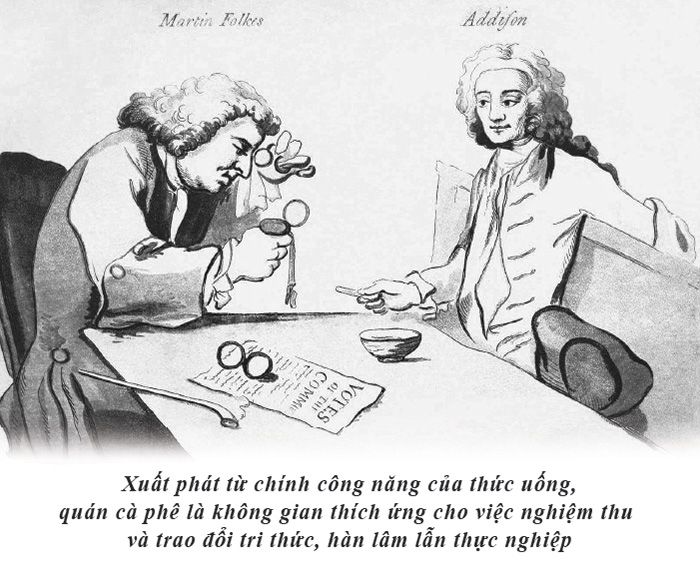
Starting from the function of the beverage itself, the coffee shop was an appropriate space for the acceptance and exchange of knowledge, both academic and application.
Coffee and coffee shops were honored as the starting energy for the scientific revolution because of the role of coffee shops in the formation of scientific academies and associations – the backbone of the process of growing up for sciences. At the cafe, many groups of scholars and researchers shaped and developed fundamental theories for modern science through joint analysis and practical experiments. Slaughter’s Coffee was famous as a center for mathematical research. Philosophers of the Rota Club shared political and philosophical issues at the Turk’s Head cafe. Chemist Peter Staehl held expert lectures at Tillyard’s Coffee. Button’s Coffee was where William Whiston and Francis Hauksbee used as a mechanical, hydrostatic, pneumatic, optical… laboratory.
This community of scholars was the basis for the establishment of specialized scientific associations. The Royal Society of London (the forerunner of the UK’s National Science Academy) was developed from a group of natural philosophers who regularly lived at the Oxford coffee club. The Royal Society of London gathered elite scientists and intellectuals including scientist Hans Sloane, astronomer Edmund Halley, physicist Isaac Newton, father of evolution – Charles Darwin… Before becoming great scientists, they were simply students curious to discover natural phenomena, enthusiastically participating in experimental sessions in cafes.
William Shipley founded the Royal Society of Arts in 1754 at Rawthmell’s Coffee house. The Cambridge Philosophical Society, St. Andrew’s Society for Graduate Study, etc. were also established from the cafes around the universities. Members of scientific societies worked towards discovering and integrating all kinds of scientific research into a coherent system to promote the development of new ideas. Experimental studies from astronomy, physics, anatomy, neuroscience, biology, chemistry, to engineering and mathematics, etc. contributed significantly in expanding world understanding.
Isaac Newton and his work “Mathematical Principles of Natural Philosophy”
Isaac Newton (1642 – 1727) is recognized as the greatest scientist of all time, having a key influence in the scientific revolution. He was elected president of the Royal Society in 1703 and often held controlled experiments with his associates on the coffee table. The debates were very lively, and new theories were born.
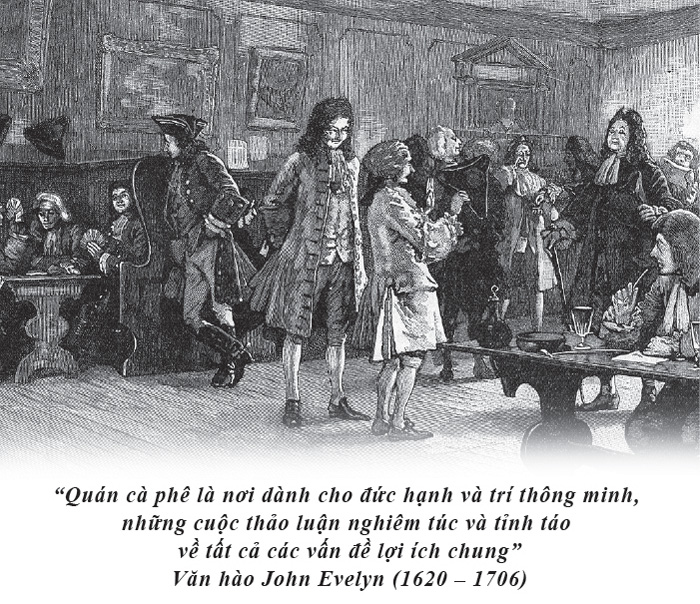
“The coffee shop is a place for virtue and intelligence, sober and serious discussions of all matters of common interest.” John Evelyn (1620–1706)
With his creative intelligence and special ability to observe and synthesize, Isaac Newton had many inventions based on the work of his predecessors. Integral calculus is a milestone in the history of mathematics that builds on the important earlier work of mathematicians Pierre de Fermat, Isaac Barrow, René Descartes, Christiaan Huygens, Blaise Pascal and John Wallis. The laws of motion that underlie classical force are derived from Galileo Galilei’s law of inertia and Giohanes Kepler’s law of motion. In addition, through continuous analytical experimentation, Isaac Newton discovered the light spectrum, which played an important role in the development of physics and astronomy.
The achievement that made his name immortal is the great work “Mathematical Principles of Natural Philosophy – Philosophiae Naturalis Principa Mathematica”. Scientists of the same time strived to uncover the greatest secrets of the universe. Many arguments took place in opposing directions. Astronomer Edmund Halley convinced Isaac Newton to write a series of books that expanded the mysteries of the universe into mathematical theories. Isaac Newton wrote continuously for 18 months to complete the book series that is considered the most important foundational work for physics of all time.
“Mathematical Principles of Natural Philosophy” answers the movement of objects, defines absolute space, absolute time, discusses the cosmic system,… Newton’s understanding of physics is the very integration of natural philosophy, empirical reasoning into the scientific method of the modern era, explaining the laws of operation of the universe according to mathematical theorems. Astronomer Pierre-Simon Laplace said: “The mathematical principle in natural philosophy has reached the highest limit that physical science can reach, a masterpiece that surpasses all products of human intelligence.” Ludwig Eduard Boltzmann – a modern mathematical physics scientist called the book “the first and greatest work on theoretical physics”.
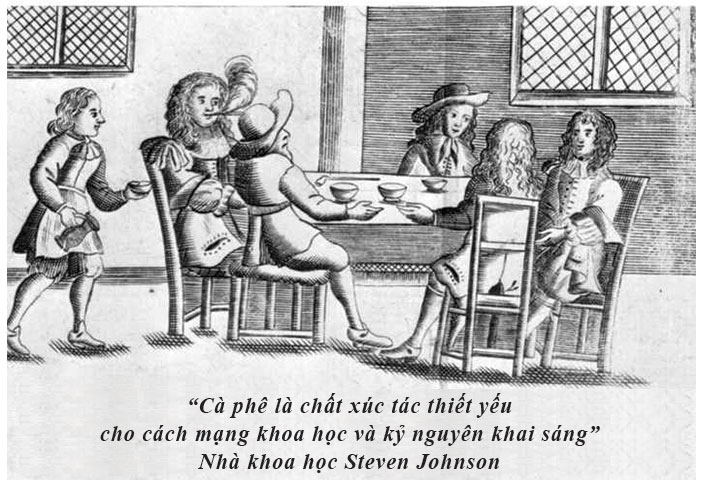
“Coffee is an essential catalyst for the scientific revolution and the era of enlightenment” Scientist Steven Johnson
Isaac Newton’s studies of motion were the basis for the development of machines, significantly influencing the development of the industrial revolution. “Mathematical Principles of Natural Philosophy” was also valid in terms of philosophical thought. Philosopher John Locke suggested that the human mind could also be explained in a way consistent with Newtonian dynamics. As a result, John Locke put forward the theory of epistemology. And even, the Freemasons – a group of intellectuals who believe in the truth of the Supreme God performed some spiritual rituals that imitated the philosophy of “Mathematical Principles of Natural Philosophy”.
“Mathematical Principles of Natural Philosophy” – Isaac Newton’s most famous classic – has been carefully selected by the Founder and Chairman of Trung Nguyen Legend Group Dang Le Nguyen Vu to create the Life-Changing Foundational Book Case. The bookcase includes more than 100 books in 12 most fundamental fields of humanity in order to build comprehensive knowledge and wisdom, contribute to the creation of a model nation, and guide the comprehensive spirit of the nation and leading to thorough wealth physically, materially, spiritually.
Scientific achievements have played a significant role in the progress of human civilization, helping people have a deeper understanding of the nature of the operation of the universe, and in fact, have served as the foundation for new and creative knowledge that enriches spiritual, material and physical life. In the process of scientific development, coffee and coffee shops have played a special role, as the energy that motivates people to aspire to discover new knowledge, and at the same time to create and perfect their own world. Seen from that perspective, it is easy to see why coffee is honored as the energy of creative intellectual revolutions such as scientific revolution, enlightenment movement, industrial revolution… Steven Johnson, a scientist has also affirmed: “Coffee is an essential catalyst for the scientific revolution and the era of enlightenment.”
THE REAL COFFEE
ROASTED ONLY FOR PEOPLE OF WISDOM!
Source: “The Philosophical Way of Coffee” – copyright by Trung Nguyen Legend


